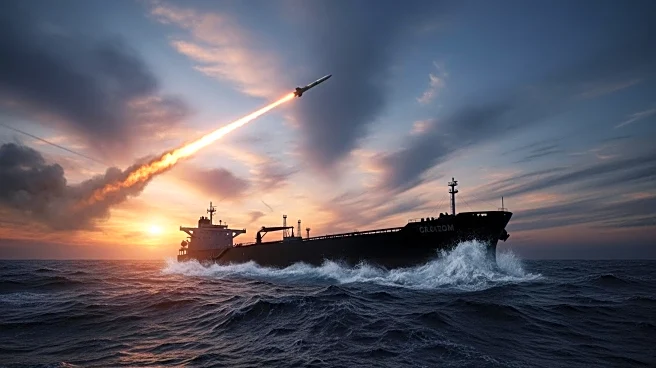What's Happening?
Yemen's Houthi rebels have launched a missile targeting an oil tanker in the Red Sea, near the coast of Saudi Arabia. The missile attack, claimed by the Houthis, is part of a series of retaliatory actions following Israeli airstrikes that killed senior Houthi leaders, including Prime Minister Ahmed al-Rahawi. The targeted vessel, the Liberian-flagged Scarlet Ray, is owned by Eastern Pacific, a company linked to Israeli billionaire Idan Ofer. Despite the attack, the vessel reportedly sustained no damage, and all crew members are safe. This incident marks a potential renewal of Houthi attacks on shipping routes in the Red Sea, a critical global waterway.
Why It's Important?
The attack underscores the ongoing volatility in the region, with significant implications for global shipping and energy markets. The Red Sea is a vital corridor for international trade, and disruptions could affect the flow of goods, including oil, impacting global supply chains and potentially leading to increased shipping costs. The incident also highlights the broader geopolitical tensions involving Iran-backed Houthi rebels, Israel, and the United States, with potential ramifications for regional stability and international diplomatic efforts. The Houthis' actions are seen as a show of solidarity with Palestinians amid the Israel-Hamas conflict, further complicating peace efforts in the Middle East.
What's Next?
The international community, including the United Nations, may increase diplomatic efforts to de-escalate tensions and secure shipping routes in the Red Sea. The U.S. and its allies might consider additional measures to protect maritime traffic and deter further Houthi attacks. Meanwhile, the potential for a new ceasefire in the Israel-Hamas conflict could influence the Houthis' military strategy. Ongoing negotiations between the U.S. and Iran over nuclear issues may also be affected, as regional hostilities continue to pose challenges to diplomatic resolutions.
Beyond the Headlines
The attack raises concerns about the safety of international maritime operations in conflict zones and the legal implications of targeting civilian vessels. It also highlights the complex interplay of regional alliances and the role of non-state actors in international conflicts. The incident may prompt discussions on the need for enhanced maritime security measures and the responsibilities of flag states in protecting their vessels.










